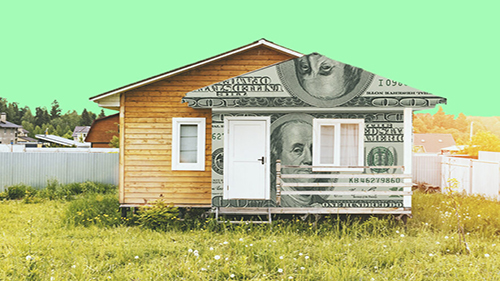
Mortgage Dove
Hard Money Loans: Everything You Need To Know
If the phrase “hard money loan” makes you think of easy and quick business deals that end in “hard, cold cash,” you’re not too far off the mark. But just because this type of loan offers fast financing doesn’t mean it’s a good or safe option for everyone.
How do hard money loans work, and why should you be wary of them? Here are some things to look for and the pros and cons you need to consider when applying for a hard money loan.
Hard Money Loans: What Are They?
A hard money loan is a short-term, non-conforming loan for commercial or investment properties that don't come from a traditional lender, but rather from an individual or company accepting property or an asset as collateral. Commercial borrowers who have had a loan or mortgage application denied may turn to hard money loans. They may also choose hard money loans to avoid the arduous process of getting approved for a loan through traditional means.
Hard money loans are secured loans, backed by the property they used to purchase, just like a traditional mortgage. In the world of hard money, "hard" refers to a tangible asset that serves as collateral. A lender can recoup its losses by taking possession of an asset when someone defaults on a secured loan.
In contrast to traditional mortgages and other types of secured loans, hard money loans have a fast and typically less stringent approval process, making them ideal for quick purchases.
When purchasing a home with a mortgage, it often takes more than a month from application to closing. It is possible to close hard money loans within a few days.
How Hard Money Loans Work
It is not the borrower's creditworthiness that determines the terms of hard money loans, but rather the value of the property used as collateral. Because traditional lenders, like banks, do not lend hard money, hard money lenders are often private individuals or companies that see the value in such a potentially risky investment.
Property flippers may seek hard money loans if they plan to renovate and resell the real estate used as collateral for the loan within one year. Despite their higher cost, hard money loans are cost-effective because the borrower plans to pay off the loan relatively quickly -- most are for one to three years -- and because they provide several other advantages.
What Factors To Consider When Applying For A Hard Money Loan
As a result of the higher risk that the lender takes by offering the loan, a hard money loan typically has a higher interest rate than financing available through banks or government lending programs. Nevertheless, the expense increase comes at the cost of faster access to capital, a less stringent approval process, and potentially more flexible repayment terms.
How Are Hard Money Loans Used?
The following are some reasons why people prefer hard money loans over traditional loans.
1. Flipping A House
The purpose of hard money loans is to help real estate investors make money by acquiring low-cost properties that require repairs and renovations, making value-enhancing repairs and upgrades, and then flipping the properties for profit.
Professional flippers often prefer faster forms of financing due to the fast pace of these projects. Additionally, house flippers sell their property within a short time frame - usually less than a year - so they don't need a longer loan term as you'd get with a traditional mortgage.
2. Purchasing Investment Property
If you want to invest in rental property but do not qualify for traditional financing, you might be able to obtain a hard money loan. You may need to use this method if your credit history makes it hard to obtain a traditional loan or if you need a higher loan amount than traditional lenders can provide.
3. Purchasing Commercial Property
A business owner who cannot obtain traditional financing might use a hard money loan to purchase commercial real estate. It can benefit entrepreneurs who purchase unique properties that won't qualify for conventional financing to take out a hard money loan. It may also be true for those who find traditional commercial loan limits insufficient.
Who Are Hard Money Lenders?
Lenders who specialize in hard money lending are generally private investors or companies. It is unlikely that your local bank will offer you a hard money loan. A hard money lender is not subject to the same regulations as a traditional, conforming loan lender. As a result, hard money lenders are, most of the time, free to make their own rules about credit scores or debt-to-income ratios they demand from their borrowers.
Despite being denied by more traditional lenders, you can find a hard money lender who will give you a loan. In hard money lending, the property value is more significant than the borrower's creditworthiness.
A Hard Money Loan's Pros and Cons
Hard money loans have pros and cons related to the approval process, loan-to-value ratios, and interest rates.
Pros
- The approval process for a hard money loan is much quicker than applying for a mortgage or other traditional loan through a bank. Due to the lender's focus on collateral rather than an applicant's financial situation, private investors who back hard money loans can make decisions faster.
- A lender spends less time reviewing financial documents and verifying income on a loan application. The process will be smoother if the borrower already has a relationship with the lender.
- As a result, hard loan investors are less concerned with receiving repayment because they might be able to resell the property themselves if the borrower defaults.
Cons
- Unlike traditional mortgages, hard money loans typically have lower LTV ratios since the property itself protects against default: around 50% to 75% versus 80% for regular mortgages (although it can increase if the borrower is an experienced flipper).
- In addition, interest rates tend to be high. Hard money loans can have even higher rates than subprime loans.
- Because of regulatory oversight and compliance rules, hard loan lenders might not provide financing for owner-occupied residences.
The Bottom Line
If you are looking for financing through a less conventional route, hard money loans can be helpful. However, these loans have high-interest rates and could be risky if your investment fails to meet your expectations. Generally, hard money loans should only get handled by professionals.
You should consider other options, such as rebuilding your credit or applying for a mortgage program like the FHA that accepts people with less-than-stellar credit if you had your mortgage application denied.
"Mortgage Dove makes home financing convenient for every American. You can count on us to provide a home buying experience tailored to your personal needs and financial situation. We strive to give you the peace of mind that your home financing goals can be achieved.”

Mortgage®
www.mortgagedove.com



-and-how-does-it-work.png)